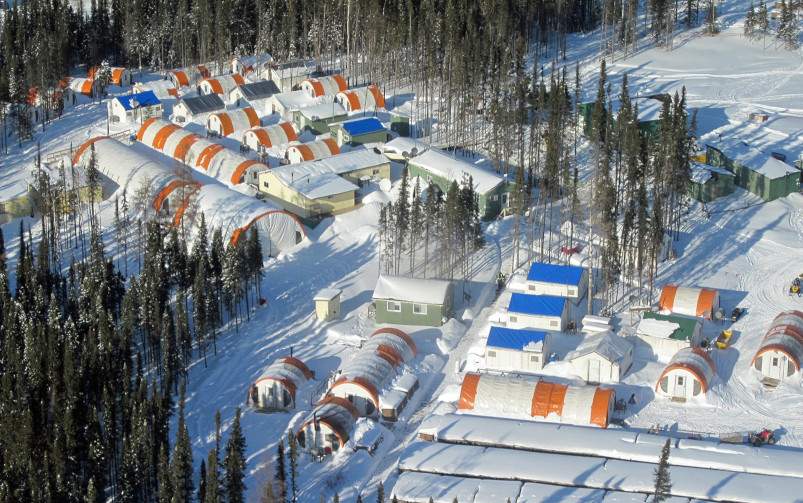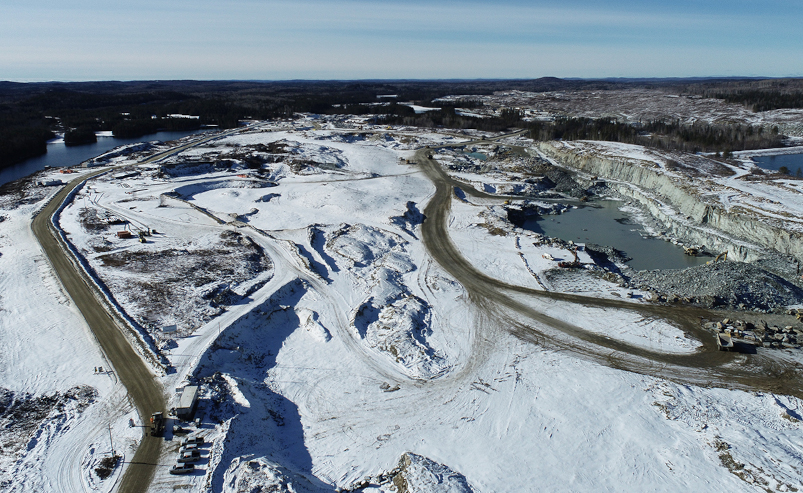Ivanhoe announced that it is beginning copper concentrate production ahead of schedule at its Kamoa-Kakula mine in the Democratic Republic of Congo. Courtesy of Ivanhoe Mines.
Welcome back to your weekly mining news recap, where we catch you up on some of the news you may have missed. This week’s headlines include efforts to get to net zero emissions, a Dutch court rules Shell must have more aggressive emission reduction targets, and new programs from Sudbury colleges that aim to fill knowledge gaps in the industry on battery electric vehicles.
Australian private equity firm Wyloo Metals Pty Ltd. said it intends to acquire Noront Resources, a Ring of Fire district exploration company, for $133 million, the Globe and Mail reports. Noront has been in the process of developing its chromite and nickel minerals projects in the James Bay Lowlands for some time, but significant hurdles, such as the construction of an access road to the region, have impeded the company’s progress. Noront says that it will consider Wyloo’s offer and inform its shareholders soon.
BHP group is in talks with Nutrien about a potential partnership in its Canadian potash venture, Bloomberg Quint reports. The two companies are reportedly discussing multiple options, including Nutrien becoming the operator and potash seller, or taking a stake in BHP’s Jansen mine. Experts say that a deal could help mitigate BHP’s operational and financial risk for the project, due to Nutrien’s status as a major potash producer.
Gratomic’s re-discovery of vein graphite in the previously abandoned Aukam mine in Namibia means it is poised to become the world’s largest producer of the mineral. Gratomic has acquired 100 per cent of the rights and interests in Aukam’s mining and exploration licences granted by the Namibian government in 2021, and plans to use a processing method that is less expensive and harmful to the environment than acid leaching and thermal purification.
Cambrian College and Collège Boréal have begun training and research programs on fleet data collection and maintenance for electric vehicles, respectively, helping to fill knowledge gaps for companies that are looking to bring battery electric vehicles (BEVs) into their fleets. The Cambrian program aims to provide companies with data in in-demand areas such as optimum vehicle servicing intervals, and the Boréal program is to equip heavy equipment mechanics with the experience to maintain BEVs.
CIM Magazine and Stantec sponsored a panel discussion entitled “Towards NetZero,” where speakers from three companies at different stages of the mining process explained how they are working to achieve net zero emissions. Representatives from Torex Gold Resources, Vale and Twin Metals provided key insights into how the mining industry, which represents an estimated four to seven per cent of greenhouse gas emissions, can work to reach the goal of net zero emissions across every stage of the mining process.
Wesdome Gold Mines announced in a pre-feasibility study on May 26 that its Kiena Mine in Val D’or, Quebec, will be restarting immediately. The mine, which has been in care and maintenance since March 2013, is expected to see production as early as Q3 of 2021, according to company president and CEO Duncan Middlemiss.
A Dutch court ordered major oil producer Royal Dutch Shell PLC to cut emissions by more than double its previous target, the Globe and Mail reports. Experts say that the litigation could eventually have an effect on Canadian companies, as a precedent has been set that can be used to generate more compelling legal arguments for emissions reductions, and could inspire new cases to emerge, despite the different national context.
Ivanhoe has announced it has begun producing copper concentrate at its Kamoa-Kakula project in the Democratic Republic of the Congo months ahead of schedule, as reported by Mining.com. According to the company, the project is projected to generate 3.8 million tonnes of ore a year at an average feed grade “well in excess of 6 per cent copper” over the first five years of operation. However, miners in the DRC received an order on May 26 banning the export of copper and cobalt concentrate from the country. Ivanhoe noted that they have also received a letter confirming that, “companies with a derogation letter from the Minister of Mines” will be allowed to export the concentrates, which will be issued on a case-by-case basis following an application from the interested party.
Sault Saint Marie-based steelmaker Algoma Steel announced a $1.7 billion merger with New York’s Legato Merger Corp., Northern Ontario Business reports. Algoma will use the funds to transition away from blast furnaces to electric-arc furnace technology, phase out the use of coal and replace iron ore feedstock with regionally available scrap steel. The company says the changes would reduce its carbon emissions to where it would become Canada’s cleanest steel producer.
New Gold has announced that it has received a Mines Act permit from the British Columbia government, enabling mining of the B3 zone of the New Afton mine. President and CEO Renaud Adams called it “[...]a significant milestone for the New Afton mine.” He continued by saying that the receipt of the B3 permit would allow ore extraction activities to begin this quarter and ramp-up over the year.
That’s all for this week! If you’ve got feedback, you can always reach us at editor@cim.org. If you’ve got something to add, why not join the conversation at our Facebook, Twitter or LinkedIn pages? Like your recap with a few more gifs? Check out our mining news recap stories on our Instagram.
Remember to stay safe, keep your distance and wash your hands!




